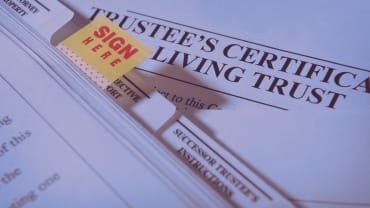TRS: The "new" online system for Trust Registration.
In 2017, HMRC established the online Trust Registration Service (TRS): a digital platform designed to allow trustees to comply with their registration obligations, whilst also broadening those obligations, resulting in more trusts being caught and therefore requiring registration.
The aim of the TRS is to reduce the risk of money laundering and make it more difficult for people to use trusts as a vehicle for committing financial crime. The TRS is governed by HMRC and requests key information regarding trusts in existence in the UK including, names, addresses and identification details of all settlors, trustees and beneficiaries, plus any key connected parties.
The onus for completion of the TRS is on the trustees. So, what do you need to know? This is the first in a series of three blogs explaining the TRS and other compliance obligations placed on trustees.
Registration of taxable vs non-taxable trusts
1. Registerable taxable trusts are trusts that have a liability to pay any tax i.e., inheritance tax, capital gains tax, income tax, LBTT and ADS. The deadline for registering existing taxable trusts has already passed, therefore all "taxable" trusts should now be on the register. The registration deadline for trusts within this category varies and we recommend seeking advice to ensure your registration obligation is met. In addition, your trust must be maintained and complete an annual declaration. We discuss this further in our next blog.
2. Registerable express trusts are trusts that were in existence on 6 October 2020 and are not due to pay any tax. The TRS opened for registration for these trusts in Autumn 2021. Trusts within this category must be registered by 1 September 2022 or within 90 days of the trust being established (whichever is later).
HMRC have advised that penalties may be charged if a trust is not registered before the registration deadline.
Can the public access information on the TRS?
The register will not be publicly accessible. Whilst law enforcement agencies across the world have access to, or can request information from, the register to help counter money laundering or terrorist financing, a third party may only request information if they have a "legitimate interest". Speculative searches are not possible, ensuring all personal data remains securely kept by HMRC.
Are there any exemptions?
HMRC have helpfully provided a number of exemptions from registration. These include, but are not limited to:
1. charitable trusts registered as a charity as in the UK;
2. trusts for bereaved children under 18, or adults aged 18 to 25 set up under the will or intestacy of a deceased parent;
3. trusts used to hold life or retirement policies where the policy pays out only on death, critical or terminal illness or permanent disablement; and
4. 'pilot trusts' set up before 6 October 2020, holding £100 or less (note: pilot trusts established after this date will need to register).
How do we register?
Registration of the trust can be completed here. Before completing the registration process, we recommend having the following information to hand:
- the trust name and date the trust was established – this can be found in the trust deed (the document responsible for establishing the trust);
- the trust address and telephone number;
- the country where the trust is based;
- details of the trust assets, including addresses of properties, and an estimated market value of any assets held by the trust;
- Tax reference number for the trust; and
- identity details (i.e. name, address, date of birth and NI number (or passport number, expiry date and country of issue) of the settlor, trustees, the beneficiaries (or class of beneficiaries); and any person exercising effective control over the trust, such as a protector or appointor.
If you have any questions on the registration requirements for your trust, please contact Claire Scott, or your usual Brodies contact.
Claire Scott is a key member of Hayley Robertson's team within the Personal & Family department at Brodies, providing services to individuals and families.
This is the first blog in a three part series on the Trust Registration Service. Click here to read part 2 and here to read part 3.











